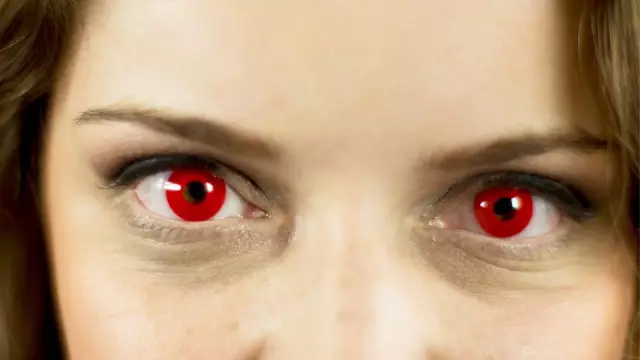- Author Rachel Wainwright wainwright@abchealthonline.com.
- Public 2023-12-15 07:39.
- Last modified 2025-11-02 20:14.
12 misconceptions about contact lenses
The number of people with vision problems is growing rapidly. According to forecasts, by 2020, about 2.5 billion people on Earth will need vision correction with glasses or contact lenses. According to statistics, only 20% of these patients prefer lenses to glasses. To a large extent, numerous misconceptions about contact lenses are "to blame" for this.

Source: depositphotos.com
Using lenses reduces visual acuity
There is an opinion that wearing contact lenses causes excessive tension of the eye muscles, which over time negatively affects visual acuity. This is not true. Correctly fitted lenses are comfortable and do not strain the eye muscles. The owner quickly gets used to them and practically does not notice them. No signs of decreased visual acuity were found in people who use lenses for a long time.
The lens may fall out of the eye
The ability of a lens to adhere to the surface of the eyeball depends on its diameter and degree of rigidity. Modern soft lenses are extremely flexible, they precisely follow the corneal configuration and remain wet for a long time, which ensures perfect contact with the surface. The risk that they will pop out of the eye with a sudden movement is extremely small.
It happens that the lens moves slightly when worn. However, firstly, such cases are rare, and secondly, the problem is easily solved: it is enough to blink a few times for the lens to snap into place.
Some people are sure that it can "crawl" into the eyeball. This is an extremely common misconception that has nothing to do with reality. The anatomical structure of the eye is such that the displacement of the lens to the back of the eyeball is completely excluded.
Lenses restrict oxygen access to the eyes
The latest generation lenses are made from materials that do not interfere with air exchange in the cornea. The parameters of each lens describe the so-called oxygen permeability coefficient, which characterizes the amount of oxygen that it passes during the day. In addition, when choosing lenses, the doctor takes into account the characteristics of the patient's body and the mode of use (only day or round the clock). When used correctly, the lenses do not suffer from a lack of oxygen.
Much depends on the care of your contact lenses. Any contamination of them reduces both the access of oxygen to the cornea and the corrective ability. Therefore, the wearer must strictly follow the recommendations for storage, cleaning and timely replacement of lenses.
Lens care is difficult
Lens care is easy and only takes a few minutes a day. However, it is important to follow the rules:
- you need to clean the lenses only with special solutions, tap or bottled drinking water is not suitable for this;
- Store lenses (for example, at night) in a container filled with a liquid that is specifically designed for this purpose. After removing the lenses, the solution must be poured out, and replaced with a fresh one for the next storage period;
- swimming in natural waters or in the pool with reusable lenses is not worth it. On their surface, salt molecules and particles of organic matter contained in the water settle, which are very difficult to wash. For bathing, it is better to use disposable lenses;
- each pair of contact lenses has a certain expiration date, after which they cannot be worn.
When wearing lenses, it is forbidden to use cosmetics
Contact vision correction is not an obstacle to the use of decorative cosmetics, but you need to apply mascara on the eyelashes and eyeliner after installing the lenses in place. If paint gets on the surface of the lens, the latter must be removed and washed.
Make-up can be removed in the evening only after the lenses are removed from the eyes and placed in a container.
Lenses can only be used for poor vision
In addition to corrective contact lenses (including colored ones), there are decorative options designed for people with 100% vision. Nevertheless, the poor choice of decorative lenses is fraught with health problems, so it is advisable to consult a doctor before purchasing them.
Lenses correct vision worse than glasses
In fact, everything is exactly the opposite. Unlike glasses, contact lenses correct vision by being directly on the surface of the eyes for optimal results. In addition, the lenses do not limit the field of view, as they rotate with the eyeball.
Lenses should not be worn for astigmatism
This statement was true several decades ago. Modern contact lenses are made using a special technology that ensures their accelerated stabilization when blinking. Therefore, they can be used for astigmatism as well.
Modern lenses are also suitable for patients with presbyopia (if different corrections for near and far vision are required). Multifocal lenses have been developed for them to effectively deal with the problem.
Lenses that contain maximum water are safe
Modern contact lenses are composed of a silicone hydrogel, which contains less water than the materials from which previous generations of lenses were made. Despite this, the latest models let in much more oxygen, are safer and have significantly higher consumer qualities.
Wearing lenses is contraindicated in children
Contact vision correction has practically no age restrictions. Children can wear lenses from an age when they can learn the necessary hygiene skills. A survey of children over 10 years old who constantly use such devices did not reveal any negative consequences. Many experts believe that shatterproof contact lenses are preferable to glasses for teenagers who lead an active lifestyle (for example, playing sports).
Lenses protect eyes from ultraviolet radiation
Some models of contact lenses are labeled UV and are positioned by manufacturers as sun protection. Unfortunately, this is only an advertisement. Such devices cannot completely protect the eyes from ultraviolet radiation.
Contact lenses are very expensive
The range of contact lenses on offer today is very wide. The cost depends on the type, material and a number of other parameters. It is always possible to choose the most affordable lenses recommended by a specialist.
There are a number of pathologies in which contact vision correction is contraindicated. Among them are some types of strabismus, mental disorders, certain anatomical features of the structure of the eyes, uncompensated glaucoma, bronchial asthma, etc. There are situations in which it is recommended to temporarily stop using contact lenses (for viral infections, parasitic (tick-borne) lesions of eyelash follicles, etc.). etc.). Caution should be exercised with regard to contact correction in case of allergy to lens material or components of cleaning solutions. If you experience discomfort, you should immediately contact an ophthalmologist.
YouTube video related to the article:

Maria Kulkes Medical journalist About the author
Education: First Moscow State Medical University named after I. M. Sechenov, specialty "General Medicine".
Found a mistake in the text? Select it and press Ctrl + Enter.






